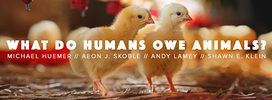Lead Essay
Michael Huemer argues that even if the pain experienced by nonhuman animals is only a little bit bad, the total quantity of pain that we inflict on animals must mean that we are committing a grave wrong in the ways that we use animals for food and clothing. Huemer addresses some of the key objections to this claim, and he emphasizes that while the full extent of our duties to animals isn’t entirely clear to him, we ought “at a minimum… to refrain from inflicting enormous pain and suffering on other beings for the sake of obtaining comparatively small gastronomic pleasures.”
Response Essays
It is not a moral wrong to eat meat, writes Aeon J. Skoble. Analogies between human suffering and the suffering of animals are facially implausible, and it is not obviously wrong, for a human, to privilege human well-being above that of other species. It is not from a failure of conscience that we eat meat, but from our natural inclination toward it, and from the nutritional benefits that meat provides. In this we closely resemble many other animals.
Andy Lamey argues that animal suffering is indeed worth taking seriously as a moral concern. So too, he adds, is animal killing. He observes that animal cruelty and the desire to hide it have prompted at least some policies that should be opposed on libertarian grounds, including farm subsidies and ag-gag laws, which prohibit reporting about conditions in factory farms.
Shawn E. Klein denies that the badness of animal suffering is such that we should always avoid it. Many types of suffering, he notes, are instrumental to higher values. While we should avoid suffering when other things are equal, that may not be the case for the uses that humans make of animals. While Klein agrees that animal cruelty should be avoided when it can be, he proposes that eating and otherwise making use of animals for human benefit is in keeping with an ethical code that seeks to further human life.
The Conversation
Coming Up
Conversation through the end of the month.

